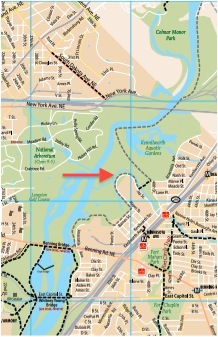Transportation Secretary Ray LaHood just announced the 47 transportation projects in 34 states (and DC) that will receive a total of almost $500 million from the TIGER (Transportation Investment Generating Economic Recovery) program. It's the fourth round of TIGER grants, bringing the total up to over $3 billion for innovative transportation projects.

Houston received $15 million to improve bicycle and pedestrian access to transit. The city with the most bike commuters in the state of Texas will get 7.9 miles of on-street bike lanes, 2.8 miles of sidewalks, and 7.5 miles of off-street paths for that money. And Chicago got $20 million for infrastructure improvements to the high-traffic 95th Street terminal and another $10.4 million to untangle freight and passenger trains, potentially reducing travel times by 50 minutes.
Here in DC, $10 million will build four miles of missing links in the bike network, connecting hundreds of miles of off-street bike paths between DC and Maryland. Shane Farthing, director of the Washington Area Bicyclist Association, says there's not much commuter traffic in that area now, partly because the connection to the vast bike network in the near Maryland suburbs was nearly impossible to access from many parts of DC. But this grant will be transformative, he says. "I don't think a lot of people realize that for a lot of DC, you can actually bike to the University of Maryland faster than you can drive or metro. And this will make that possible for an entire new segment of the District."
The College Park metro station is a half-hour walk to the University of Maryland library. This could create a whole new transportation option for the 58 percent of UMD students that commute to school from off-campus -- and could make attendance possible for many in the District who otherwise would have no reasonable way of getting there. The university is a 25-minute bike ride from the neighborhood in DC the new trail will connect to. That neighborhood is a low-income, predominantly African-American part of DC, east of the Anacostia River.
Due to a lot of time-consuming and relatively expensive environmental remediation that needs to happen, the bike route will be built in stages. Before the off-road facilities can be built, they'll install on-street signage, making neighborhood bicycle connections that will remain in place, Farthing says, even after the off-road path is built. "It's the best of both worlds," he said.
The League of American Bicyclists points out some other exciting bike projects that were awarded TIGER grants, including one to put downtown Concord, New Hampshire on a bicycle-friendly road diet, another to connect downtown Tampa by completing important greenways, and another to include bike lanes on a new bridge in the Maine bicycle system.
However, another DC proposal to improve bike and pedestrian access to seven transit stations and hubs was rejected, unfortunately -- one of many disappointed applicants this time. This round of TIGER was vastly oversubscribed, like every round before it. According to U.S. DOT, the 703 applications the agency received amounted to 20 times the amount of money available.
A few notes from U.S. DOT about the winners:
- Of the $500 million in TIGER 2012 funds available for grants, more than $120 million will go to critical projects in rural areas.
- Roughly 35 percent of the funding will go to road and bridge projects, including more than $30 million for the replacement of rural roads and bridges that need improvements to address safety and state of good repair deficiencies.
- 16 percent of the funding will support transit projects like the Wave Streetcar Project in Fort Lauderdale.
- 13 percent of the funding will support high-speed and intercity passenger rail projects like the Raleigh Union Station Project in North Carolina.
- 12 percent will go to freight rail projects, including elements of the CREATE (Chicago Region Environmental and Transportation Efficiency) program to reduce freight rail congestion in Chicago.
- 12 percent will go to multimodal, bicycle and pedestrian projects like the Main Street to Main Street Multimodal Corridor project connecting Memphis and West Memphis.
- 12 percent will help build port projects like the Outer Harbor Intermodal Terminal at the Port of Oakland.
- Three grants were also directed to tribal governments to create jobs and address critical transportation needs in Indian country.
The full list is available here [PDF].
Despite the program's immense popularity, the House of Representatives zeroed out funding for the TIGER grant program in its budget proposal for next year. The Senate proposal, however, would keep $500 million for the next round.





